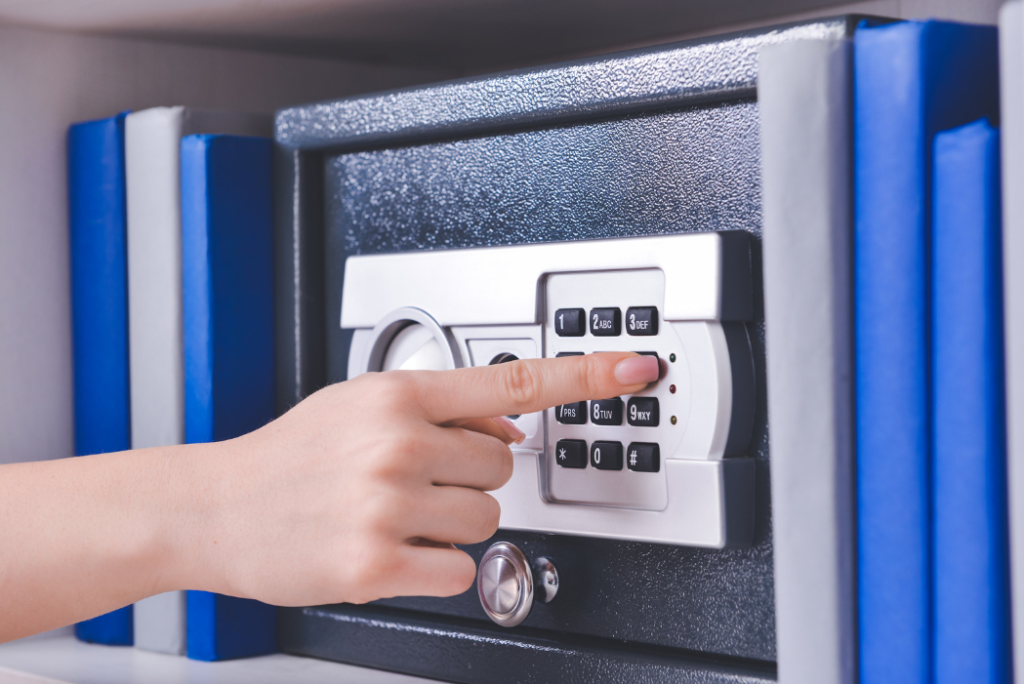Introduction
Safes are essential for protecting valuable items and important documents from theft, fire, and other potential hazards. With various types of safes available, each designed for specific purposes, it’s crucial to choose the right one to meet your security needs. In this guide, we’ll explore the different types of safes, locking mechanisms, and specialty safes, along with the importance of UL ratings. At RBD Security, we offer professional installation and services, including recoding, lockout assistance, and mechanism replacement for all types of safes.
Types of Safes: Protecting What Matters Most
Choosing the right safe involves understanding the various types available and their specific features. Here’s a breakdown of the most common types of safes:
Fire Safes
Fire safes are designed to protect your valuable documents, digital media, and other sensitive items from high temperatures and flames.
- Heat Resistance: These safes are built to withstand intense heat for a specified period, usually ranging from 30 minutes to 2 hours.
- Ideal Use: Fire safes are perfect for storing important documents, family photos, digital backups, and other items that need protection from fire but may not require high levels of security against theft.
Burglary Safes
Burglary safes are constructed to resist break-ins and protect valuable items from theft.
- Robust Construction: Made with thick steel walls and complex locking mechanisms, these safes are difficult to breach.
- Ideal Use: Use burglary safes for valuable items such as jewelry, cash, firearms, and other high-value possessions that need protection from burglars.
Specialty Safes
Specialty safes are designed for specific items and purposes, offering tailored security solutions.
- Cash Safes: These safes are designed for businesses or individuals who need to secure large amounts of cash. They often include features like drop slots and time-delay locks to deter theft.
- Jewelry Safes: Built with multiple compartments and lined interiors, jewelry safes provide organized and secure storage for jewelry, watches, and other valuables.
Types of Locks: Security and Convenience
The locking mechanism of a safe is a critical aspect of its security. Here are the common types of locks used in safes:
Mechanical Dial Locks
Mechanical dial locks are traditional locks that use a combination dial to secure the safe.
- Reliability: Known for their durability and reliability, mechanical dial locks do not require batteries or electrical power.
- Ideal Use: Suitable for those who prefer a classic and robust locking mechanism without the need for technology.
Key Locks
Key locks use a physical key to open the safe, providing a straightforward and familiar method of access.
- Simplicity: Easy to use and reliable, key locks are ideal for those who prefer simple and quick access to their safe.
- Ideal Use: Perfect for small safes or backup locks on more complex security systems.
Electronic Locks
Electronic locks offer modern security features and convenience through the use of a digital keypad.
- Advanced Features: These locks often include additional security features such as biometric access, multiple user codes, and automatic locking.
- Ideal Use: Great for those who want quick access and the ability to change codes frequently without the need for a locksmith.
Understanding UL Ratings for Safes
The Underwriters Laboratories (UL) rating system provides a standardized way to measure the security and fire resistance of safes. Here’s what you need to know:
- Burglary Ratings: UL ratings such as TL-15, TL-30, and TRTL-30X6 indicate the safe’s ability to withstand attacks from various tools for a specified amount of time.
- Fire Ratings: UL fire ratings like 350-1hr or 125-2hr indicate the safe’s ability to protect contents from high temperatures for the specified duration, with the number representing the internal temperature in degrees Fahrenheit and the time period.
Residential Safes: Secure Your Home
Residential safes are designed to offer a balance of security and convenience for home use.
- Versatile Options: These safes come in various sizes and types, including wall safes, floor safes, and portable safes.
- Ideal Use: Ideal for storing important documents, jewelry, cash, and other valuables within your home, providing peace of mind and easy access.
Professional Installation and Services
At RBD Security, we provide comprehensive safe services to ensure your valuables are always protected.
- Installation: We offer professional safe installation to ensure your safe is securely and properly placed in your home or business.
- Recoding: Our experts can recode analog safes to update or change the combination, enhancing security without replacing the entire lock.
- Lockout Assistance: If you’re locked out of your safe, our team can help you regain access quickly and safely.
- Mechanism Replacement: We can replace faulty or outdated locking mechanisms to ensure your safe continues to provide reliable security.
